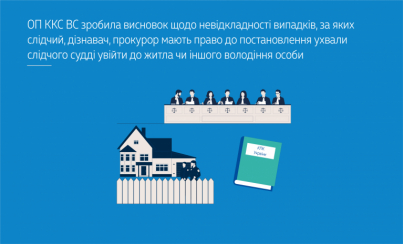Contact center of the Ukrainian Judiciary 044 207-35-46

Investigators, pre-trial inquiry officers, and prosecutors have the right to enter a person's home or other property in urgent cases, in particular to save material objects (property) that may potentially be material evidence in criminal proceedings from foreseeable destruction or loss, before the investigating judge issues a ruling.
In connection with Part 3 of Article 233 of the Criminal Procedure Code of Ukraine, the urgency of such a case is demonstrated by data on the real threat of destruction or loss of property. In the motion for a search warrant under Part 3 of Article 233 of the Criminal Procedure Code of Ukraine, in the materials submitted in support thereof, and in the decision of the investigating judge issued after the fact, it shall be stated what circumstances at the time of the intrusion indicated that the delay could lead to the destruction of material evidence, that the information on the threat of its destruction or loss gave grounds to consider it as real.
In terms of implementing the rules of Part 3 of Article 233 of the CPC of Ukraine, non-compliance with the above provisions of the law, failure to comply with the requirement to immediately apply to the investigating judge with a motion to conduct a search, in the absence of objective obstacles to file a relevant motion as soon as possible after the end of the investigative search action, is a ground for the investigating judge to refuse to legalise the search ex post factum.
This conclusion was reached by the Joint Chamber of the Criminal Cassation Court of the Supreme Court in case No. 466/525/22.
In this proceeding, police officers found eight bundles of particularly dangerous psychotropic substances, the circulation of which is prohibited, during a personal search of the convict. After that, on the basis of the investigator's decision, without the prior permission of the investigating judge, a search was conducted at the convict's place of residence, during which particularly dangerous drugs and psychotropic substances were seized. Due to the fact that the search was carried out at night, the investigator applied to the investigating judge the next day during court working hours with a motion to conduct a search. The investigating judge issued an ex post factum search warrant on the grounds that there was a real threat of loss of evidence in the criminal proceedings and therefore considered that there was an urgent case.
The court of first instance, with which the court of appeal agreed, declared the search report inadmissible as evidence and, on the basis of the 'fruit of the poisonous tree' doctrine, all evidence derived from it. The local court reasoned that the right of an investigator or prosecutor to enter and search a home may arise, inter alia, before the investigating judge's ruling in urgent cases relating to the salvation of property. On the contrary, the investigator's decision to conduct an urgent search of the convicted person's home and the motion to conduct such a search approved by the prosecutor do not constitute grounds for conducting the said investigative measure as urgent.
The mere discovery and recording of information on the circumstances of the crime during the search under Article 307 of the Criminal Code of Ukraine is not a sufficient basis for its subsequent legalisation by the investigating judge. There is no proper justification of the reasons included in the list of urgent reasons in the relevant motion, so the investigating judge had no grounds to conclude that the investigative action was urgent.
Based on the results of the proceedings, the Joint Chamber sees no reason to contradict the conclusions of the courts of previous instances regarding the inadmissibility of the search protocol and considers them reasonable and correct.
The full text of the resolution of the Joint Chamber of the Criminal Cassation Court of the Supreme Court of 7 October 2024 in case No. 466/525/22 (proceedings No. 51-7310кмо23) will be available in the Unified State Register of Court Decisions- https://reyestr.court.gov.ua/Review/122272945.